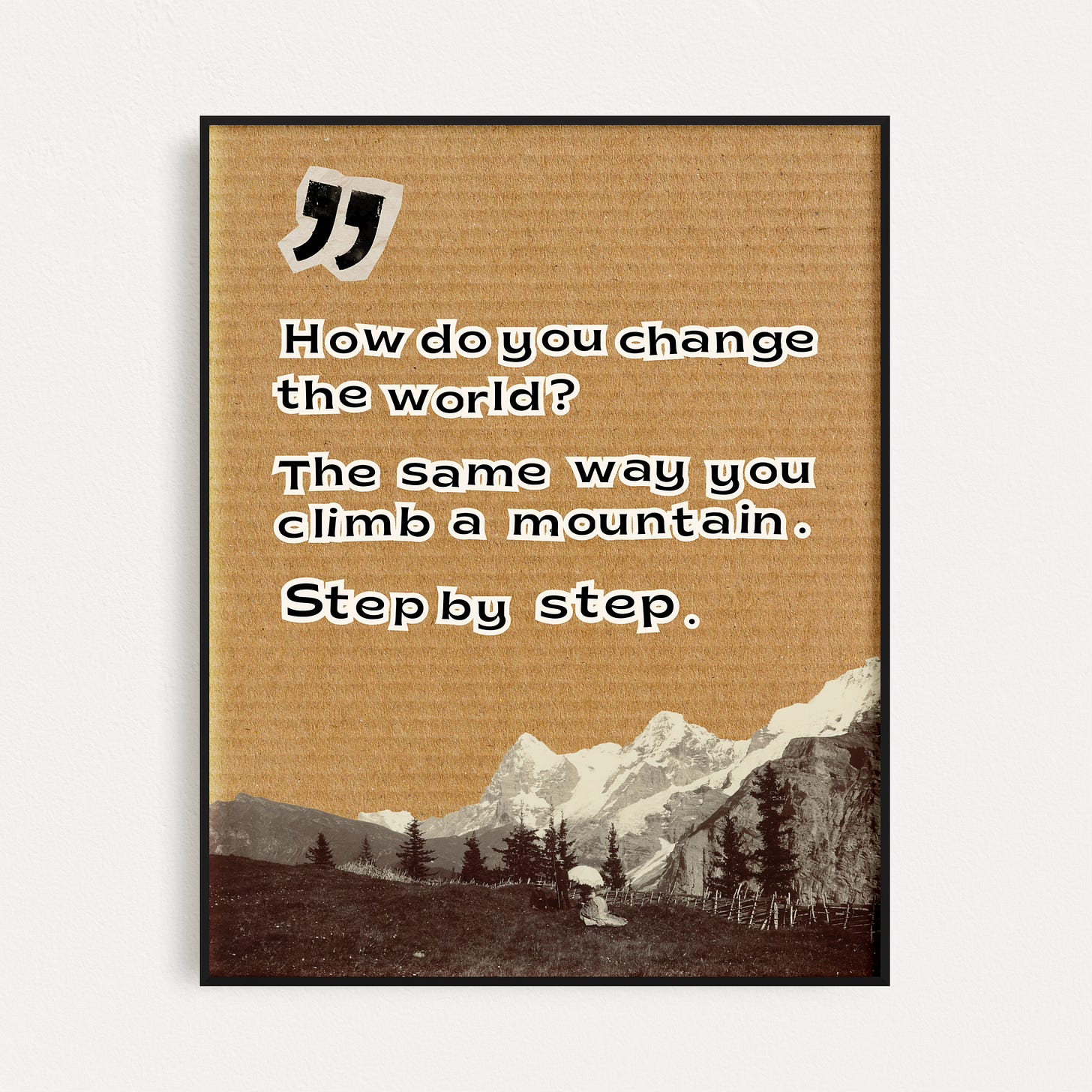My therapist can't save me from capitalism, and yours can't save you, either
The problem with individual healing as a solution for systemic issues
These days, my therapist and I spend a lot of time sitting in silence.
At first, it felt awkward. But now, I see these moments for what they are—the only chances I get to sit with the heaviness of this world in the presence of another human being without feeling obligated to do anything but exhale.
In those quiet moments, I find myself waiting for them to break the silence—to offer some profound insight that makes the world's cruelty feel manageable.
I find myself hoping that they can prove me wrong. I want them to tell me that I'm just being dramatic—that my rage is just misplaced anxiety.
Selfishly, I want them to tell me that if I just process my childhood trauma more thoroughly, develop better coping mechanisms, and practice more self-care, I can be exempted from the chaos of this world.
But the silence stretches on because we both know the truth: there's no amount of therapy that can protect us from systems designed to exhaust us.
My therapist can't save me from capitalism, and yours can't save you, either.
The Seductive Promise of Individualized Solutions
When the world feels too big and broken to change, individual healing offers the illusion of control.
If the problem is my relationship with money rather than the fact that wages haven't kept up with cost of living for decades, then at least there's something I can do about it. If I'm always cycling between rage, grief, and disbelief at the inequity of this world, I can spend $7.99/month for a guided meditation app.
Your anxiety isn't just a personal struggle—it's a revenue stream.
Your depression isn't just brain chemistry—it's a subscription model.
The same economic system that forces you to work your life away is also ready to sell you a venture fund-backed app that can soothe the side of effects of the problem that it continues to exacerbate.
Here's the thing: some of these individual solutions actually work—for a while, for some people. Therapy can help you negotiate a better salary. Meditation can help you tolerate a toxic workplace. Self-care can help you function despite chronic burnout.
But the sporadic success of these solutions can create a dangerous illusion.
If an individualized solution "saves" me from capitalism but leaves everyone I know stuck in the same trap, I didn't save myself from capitalism—I just changed my social class.
This is the seductive lie at the heart of the wellness industry: that liberation is something you can buy, that freedom is something you can achieve alone, that your individual healing somehow exempts you from collective suffering. It's a form of spiritual bypassing dressed up as empowerment—a way to feel like you've transcended systems of oppression without actually challenging them.
Sometimes I wish my therapist would lie to me—but in order for that lie to offer me temporary respite, I would also have to lie to myself.
I've lived within these systems long enough to recognize their patterns, to feel their weight in my bones. No amount of reframing can make exploitation feel like opportunity.
I don't want a modality of therapy that teaches me how to feel at peace with a world that has enough money to feed the billions of starving people worldwide—but chooses not to.
Over the years, I've learned to distinguish between two fundamentally different approaches to therapy: one that helps me cope with broken systems, and another that helps me understand why those systems are broken in the first place.
The first approach keeps me functional within dysfunction—teaching me breathing exercises while the world burns, offering me individual strategies for surviving collective trauma. The second approach does something more dangerous: it helps me see clearly, think critically, and imagine that the way things are is not the way things have to be.
The Difference Between Coping and Healing
The distinction between these two approaches to therapy can be the difference between surviving and thriving, between temporary relief and lasting change.
When therapy helps me cope with capitalism, I learn to manage my symptoms while the disease continues to spread. When therapy helps me understand capitalism, I learn to name what's making me sick in the first place.
But here's what both approaches miss when practiced in isolation: healing doesn't happen in a vacuum. It happens in relationship—not just with a therapist, but with community.
My therapist can help me process my feelings about living in a world where eggs cost $8/dozen. But it's my friends that send me UberEats codes when my freelance checks are running late.
My therapist can help me understand why I feel guilty taking sick days in a culture that equates productivity with worth. But it's my friends who tell me to sit my ass down when I'm trying to push through the unpushthrough-able.
My therapist can help me practice setting boundaries with exploitative employers. But it's my community that affirms: "they pay you for 40/hour weeks, not 24/7."
My therapist can't save me from capitalism. But they can help me remember that my struggles are not personal failures—they're the predictable result of living in systems that prioritize profit over people.
They can help me understand that healing happens in relationship, that individual work is just the beginning, not the end.
They can teach me to feel deeply without drowning, to rage without burning out, to hope without naivety.
And sometimes, this form of knowing is the only thing that stops me from irreparably and completely unraveling, once and for all.
Most importantly, they can help me remember that the work of healing and the work of justice are not separate endeavors. We can't heal our way out of systemic oppression. But we can heal our way into collective resistance.
And maybe that's the point—not to escape into individual transcendence, but to develop the emotional resilience needed for the long work of transformation. Not to cure ourselves of justified anger, but to sustain it without letting it consume us.
The silence in my therapist's office isn't empty space waiting to be filled with surface-level solutions or tired cliches. It's sacred space where I can feel the full weight of what we're up against—and remember that I don't have to carry it alone.
I am deeply thankful for your support. If my words have helped you in some way, please consider sharing them with others. If you have the means to do so, you could also support my work directly by buying me a coffee.
About the writer:
I’m Michell—I’m a 35-year-old father, husband, and writer. I’m thankful that you’ve taken the time to read my work. Any support you feel led to give in the form of a like, comment, repost, or purchase is deeply appreciated.
You can purchase my book, Eyes On The Road, here.
You can purchase my art, some of which is displayed below, here.







“And maybe that's the point—not to escape into individual transcendence, but to develop the emotional resilience needed for the long work of transformation”. I love this sentiment. Thank you as always for your words.
Greetings from a therapist who works systemically with individuals and organisations. This is such a thought-provoking post. Thank you for naming the dualities that we have to hold and navigate as a collective 🙏